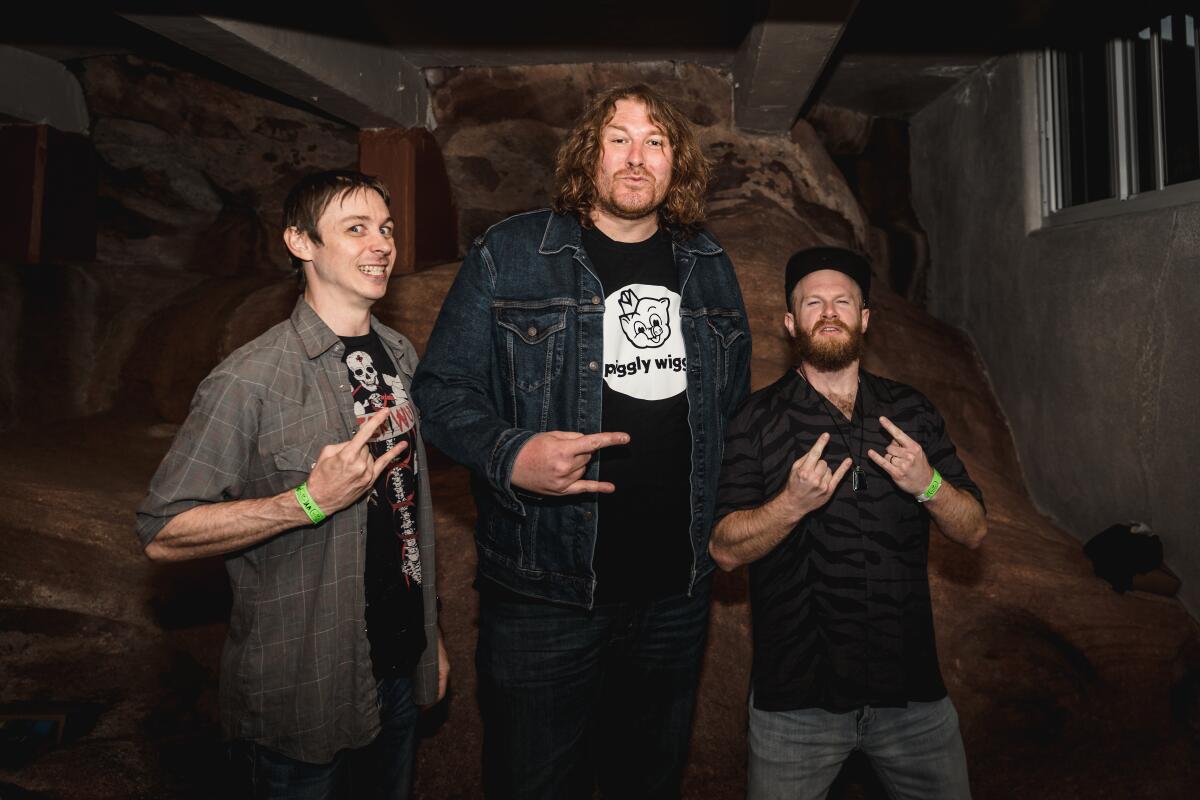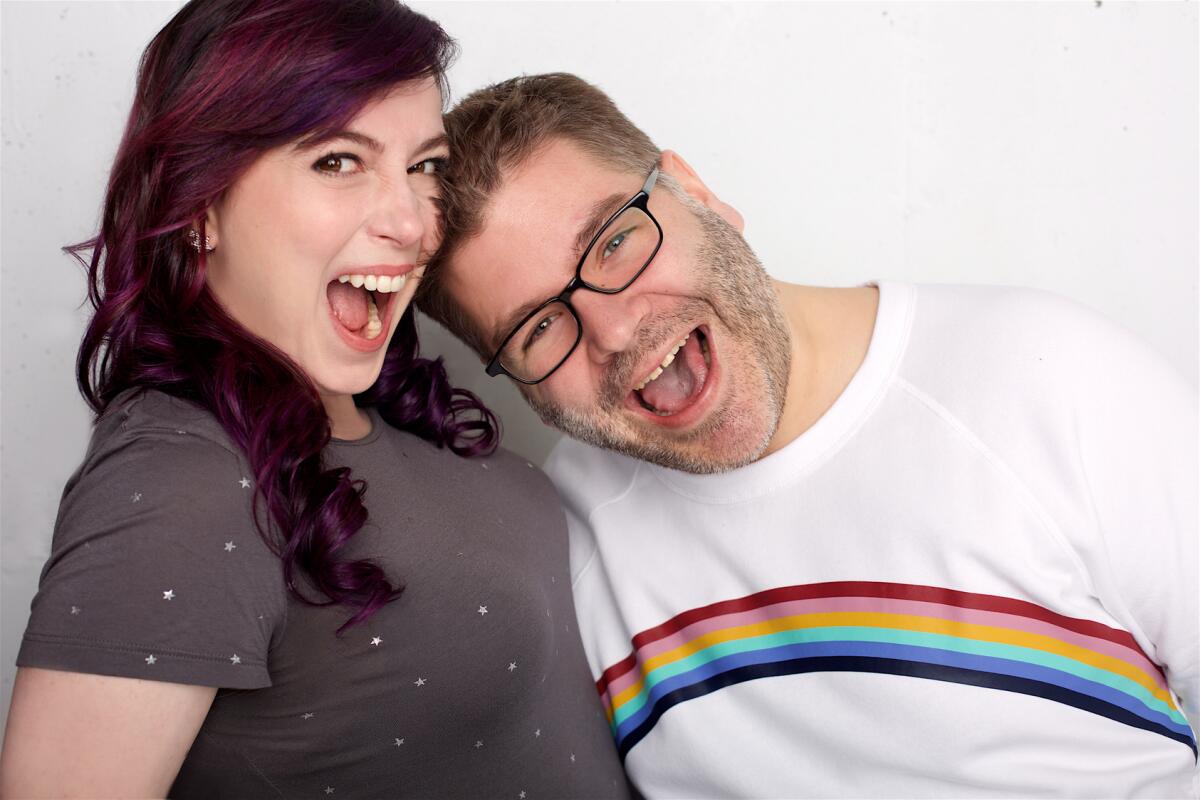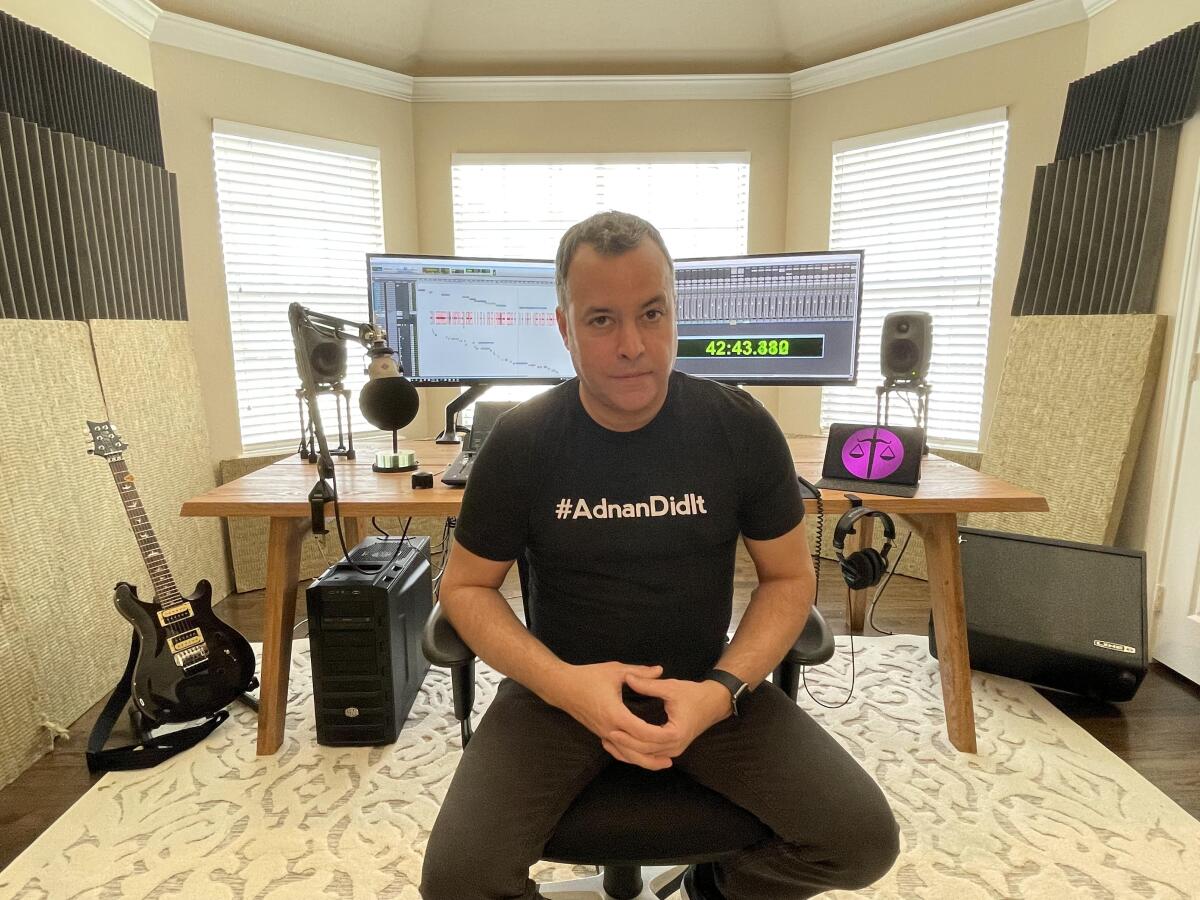True crime comedy podcasts make a killing pairing grisly stories with gallows humor

- Share via
In 2022, it’s common to get the gruesome details of a real-life homicide from shows that are made to entertain. It’s also common for it to be spoken about in such a way during re-enactments that one might find humor in a killer’s horrible bowl cut while he’s carrying out said crime.
If you’ve ever watched “Forensic Files,” you’ve learned a million ways to get caught. In the same vein, you’ve also received an education on how not to get killed. On the off chance you do get killed in a crazy way, maybe by your partner while you’re documenting a road trip, there will be someone there to talk about it — a reporter, an old friend you haven’t seen in 15 years on Facebook or a podcaster.
The pendulum swings on whether laughter is the best medicine for tragedy or talking through a terrible event with someone trusted is the way to go. If you combine the two, what you have just might be the cure — true crime comedy podcasts.
Whether you’re a fan or not, the true crime genre is a staple of our TV watching and podcast consumption landscape, and studios are constantly searching for ways to improve on the format. Knock, knock. Who’s there? Comedy.
“Comedy has always been a part of the true crime fascination,” says Henry Zebrowski, one of the three co-hosts of “The Last Podcast on the Left.” “It goes back literally hundreds of years, so we’re part of a long-standing tradition of people that use humor to deal with the horrific nature of the facts.”

Patrick Hinds, co-host of “True Crime Obsessed,” credits the podcast “My Favorite Murder” for paving the way for funny friends to process traumatic events. “I think we all got into this world to talk about these stories with our friends and not to make light of something fascinating yet traumatizing,” Hinds says.
True crime comedy podcast hosts agree that laughing can help quell the shock of a grisly case. We all have preferred coping mechanisms. “True crime comedy is basically a recording of gallows humor. It may be new in entertainment, but it’s nothing new in humanity. Humans have always been this way,” says Marcus Parks a co-host on “The Last Podcast on the Left.”
When adding comedy aspects to a stranger’s death, most podcasters tend to err on the side of reverence.
Rachel Fisher, who covers a variety of topics surrounding L.A. for “Hollywood Crime Scene” and is respectful about crime victims, says: “There’s plenty to laugh about that doesn’t come at the expense of a victim. There can be absurd elements in a story that are funny.”
Co-host Desi Jedeikin adds, “The criminals, an incompetent investigation, bad media coverage and people who let the victim down are all fair game.”
Friends just sitting around talking about a horrific crime is how most of these true crime comedy podcasts start. They’re not setting out to victim blame; they’re trying to make one another laugh by picking apart the many other details. “We’re so comfortable with each other that we can be real about what’s enraging. Like the dishes that aren’t done in the sink,” said Gillian Pensavalle, co-host of “True Crime Obsessed.”
Adding a comedy edge to such a topic will certainly test a listener’s comfort level. If hosts are straight with the facts, though, what listeners learn could be an actual life saver. Zebrowski always makes sure he does his research before grabbing the podcast mic to crack a joke. “To me, it’s all about how we come at it from an educational standpoint, so I know what I’m talking about. I’ve done my homework before I start making c— jokes.”
Although men statistically consume podcasts more frequently, an online survey found that 73% of true crime podcast listeners are female. On average, 85% of homicide suspects covered in true crime podcasts are men. Could it be that women are looking to true crime podcasts not only to soak up entertainment but to also learn how to better protect themselves?

Mike Boudet of “Sword & Scale” says his podcast audience is somewhere between 70% to 76% female. “Women often listen to these stories as a PSA [public service announcement], whereas men tend to get stressed because it gives them feelings of wanting to be a protector. Men just don’t think about the safety issues like women regularly do, unless it’s a fight-or-flight response.”
Most females are taught to always be aware of their surroundings from a young age. Always look out for sketchy people, always be on high alert at night — whether you think that’s sad or safe, it’s a necessity. Predators don’t want something that is hard to get or kill.
“I’m open with my experiences, so there’s a relatability with it. All the stigmas that are attached to these crimes, what was she wearing or drinking, I’m happy to speak out against that. The more we talk about it, the more we can dismantle it,” Pensavalle says.
Hinds says pairing up with Pensaville has been an eye-opening experience for him when it comes to learning how women view situations. “I’ve never once felt unsafe working with these cases, and with Gillian, I now understand that women can’t just feel safe, whereas I do,” he says. “I think the education goes both ways.”
True crime podcasting took off in 2014 when “Serial” shattered records with 5 million iTunes downloads. People aren’t just watching documentaries; they’re also listening to them via podcasts.
“Not once is the blame on the person who gets killed. If anything, it’s on police departments, federal governments and policies that put people in these situations. Killers know that if they target a certain group of people, they won’t be investigated,” Parks says.
“There’s a reason no serial killers target Fortune 500 CEOs,” Zebrowski adds.
An adorable child, an attractive adult or someone relatable goes missing and people around the globe turn into detectives, legal experts and even comedians. Someone’s worst day turns into a choose-your-own-adventure through a wide range of media.
And although public “meddling” in an investigation can be both positive and negative, laughing through the pain can be therapeutic for some. “We’ve actually met a lot of people who’ve survived horrific situations and tell us that we helped them get through their trauma. They say that it helps to laugh and [that] not having all of that weight on them helps deflate them,” Parks says.
Jedeikin says she realizes that her podcast with Fisher isn’t for everyone; they’ve received complaints about language, even with an explicit labeling. “I might have too dark of a sense of humor for some, but I know it can be a relief for others to see how I use humor when discussing dark stories. Including my own. We get a lot of emails expressing gratitude for helping people laugh through the pain of their own circumstances,” Jedeikin says.
“It’s the most real human drama you can have. It’s murder. That’s what makes this genre compelling,” Boudet says. “In a way, it’s a sick fascination, but it’s like rubbernecking when you see an accident on the road. It’s just part of human nature.”
More to Read
The biggest entertainment stories
Get our big stories about Hollywood, film, television, music, arts, culture and more right in your inbox as soon as they publish.
You may occasionally receive promotional content from the Los Angeles Times.










